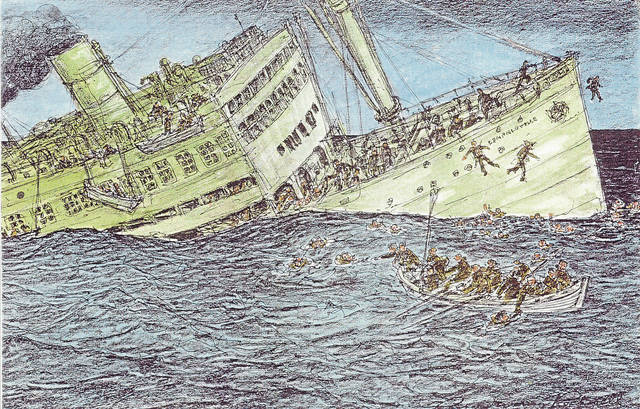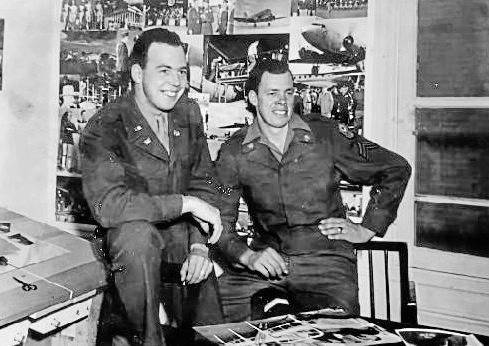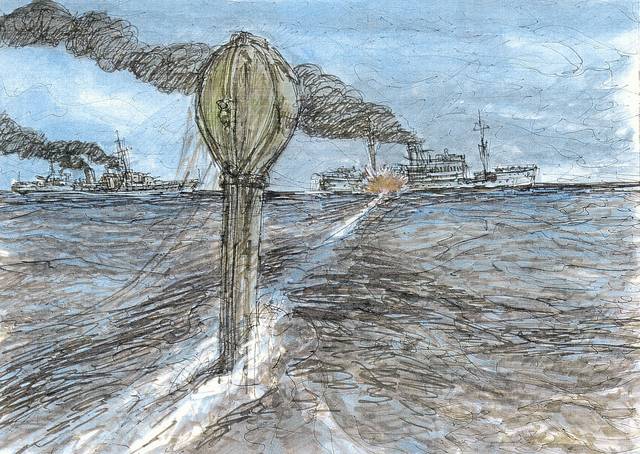Manor World War II veteran survived little-known Christmas Eve disaster off French coast
Carl Monk, like many World War II veterans, didn’t talk much about his experiences serving with the Army in Europe.
He had a small shrapnel scar on his left elbow, received as his infantry unit fought in France in early 1945, and a brief tale of surviving a German submarine attack on his transport ship on Christmas Eve 1944 about 5 miles from its destination, Cherbourg.
“All he ever said was the boat was torpedoed,” said his widow, June Monk, 95, of Manor. “He told me somebody pulled him out of the water and laid him on the deck of a small French ship.
“He never wanted to go on a large ship after that.”
After her husband’s death at age 85, in 2008, June Monk learned just how lucky her husband was to be among the survivors of the torpedoed SS Leopoldville. The Belgian vessel, a former passenger liner, was transporting more than 2,000 members of the U.S. Army 66th Infantry Division from Southampton, England, to join the fighting in France.
“Somebody told me there was an article on the internet, and I got a lot of information about the Leopoldville,” Monk said. Based on accounts of survivors, she said, “They weren’t shown anything about what to do with the life rafts.”
The transport ship’s sinking claimed the lives of 763 American servicemen, including more than 70 Pennsylvanians. Area casualties included Pfc. Glenn Elvin Lowry and Pfc. Jack Nevin Lowry, twin brothers and 1942 graduates of Rostraver High School.
The incident is considered to be the largest military catastrophe to strike an infantry division subject to a submarine attack in American history.
Monk learned that her husband and other survivors had been told by their superiors to keep mum about details of the torpedo attack and rescue. But word began to get out years later, after related information became declassified.
“Around 1994, some of these guys started talking to the media,” said Allan Andrade, a retired New York City police investigator, whose book on the incident, “Leopoldville: A Tragedy Too Long Secret,” Monk owns.
Despite that book and works by other authors and television documentaries about the sinking, “Even now, it’s one of the least known incidents from World War II,” Andrade said.
He helped to found the Leopoldville Memorial Association and is the historian for Leopoldville.org, a website “dedicated to remembering and honoring the sacrifice of those who died in the disaster and the valor of those who survived.”
Circumstances combined to create obstacles in the rescue, according to Andrade.
He learned through his research that, because of a difference in radio frequencies, vessels in the Cherbourg harbor didn’t find out about the torpedo attack until a message was sent from the Leopoldville to England and relayed back to France.
“There was a 45-minute delay,” he said, adding that many of the crews in Cherbourg had to be recalled from Christmas Eve leaves. “You had to round them up and get them back to their boats,” he said. “Then you’ve got to charge up your engines. All of this is taking time.”
According to Andrade, it took a half-hour for the HMS Brilliant, a British ship that was accompanying the Leopoldville, to pull alongside the damaged transport. Many jumped to the deck of the Brilliant. But those who missed risked being crushed between the vessels, drowning or succumbing to hypothermia in the chilling water.
Because of fears that the Leopoldville could drift into a mine field, it was advised to drop anchor, Andrade said.
But, he noted, “Once you drop the anchor, that creates another problem: the ship was going to sink.
“It was not just one thing. It was a whole series of things. When you put it all together, you have a terrible tragedy.”
Eventually, more than 35 vessels of various types took part in the rescue.
“Some guys did unbelievable things to save as many as they could,” Andrade said. “One guy got out of his hospital bed with an infected foot and rushed back to his ship. He couldn’t swim, but he jumped overboard to pull some guys in.”
One of Carl Monk’s last duties before being discharged from the Army as a sergeant was watching over German prisoners of war in Marseille. He also had a chance meeting with his older brother, Sam, an Army Air Corps warrant officer. They crossed paths at a French railroad depot as Carl was headed for a rest and recreation break in Switzerland and Sam was returning.
After the war, Carl Monk, a native of Grove City, took advantage of the G.I. Bill and earned a degree in electrical engineering. He became a superintendent of Bethlehem Steel’s car shop in Johnstown and, before retiring, was a self-employed electrical and welding engineer for Monk Engineering.
The Monks raised five children, and the family has grown to include three grandchildren and four great-grandchildren.
“I always dread Christmas Eve because it brings back those memories,” June Monk said of the details she now knows about the Leopoldville’s sinking. “I always have a bad feeling thinking about those men who had to jump in the dark into the icy water.”
But, she added, the tragedy for many others was actually “a blessing in disguise” for her husband. Delayed by the sinking and his subsequent rescue, “he missed the main part of the fighting in the Battle of the Bulge,” she said. “It took me a long time to wake up to that fact.”
Jeff Himler is a TribLive reporter covering Greater Latrobe, Ligonier Valley, Mt. Pleasant Area and Derry Area school districts and their communities. He also reports on transportation issues. A journalist for more than three decades, he enjoys delving into local history. He can be reached at jhimler@triblive.com.
Remove the ads from your TribLIVE reading experience but still support the journalists who create the content with TribLIVE Ad-Free.





